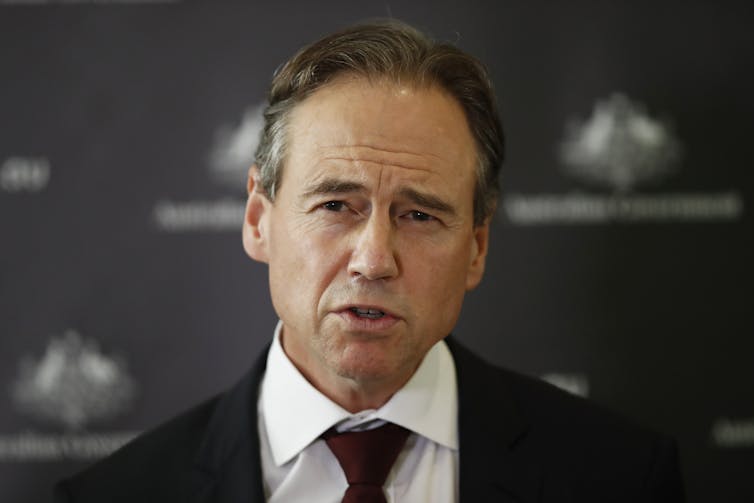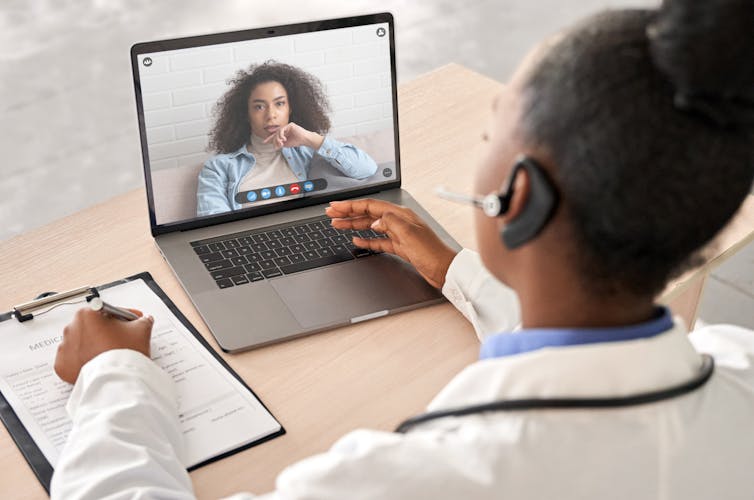Last week, the Australian government announced it will provide ten extra Medicare-subsidised psychological therapy sessions for Australians in lockdown areas due to COVID-19.
In such a stressful time, many people are experiencing poorer mental health, and some need additional support. However, our mental health system is complex and fragmented, so it can be challenging to find the care you need.
Here’s how to start seeing a therapist if you never have before.
What is a mental health treatment plan?
Under Medicare, you can already access ten subsidised sessions per calendar year with a registered psychologist, social worker or occupational therapist. Twenty sessions are now subsidised “for anybody who has used their initial ten services in a lockdown area under a public health order,” said Federal Health Minister Greg Hunt. Currently this includes all of Victoria.
But to get access to these sessions, first you need to get a mental health treatment plan from your GP. This involves an assessment of your physical and mental health, and a discussion of your particular needs. The GP then helps you decide what services you need.
All GPs who write mental health treatment plans have undergone additional training in mental health. There are also plenty of GPs with further interest and expertise in this area. It can be helpful to ask for recommendations from friends and family if you are unsure who to see.

Physical and mental health issues frequently overlap, so a visit to a GP is an opportunity to assess any physical issues that may impact mental health as well. The GP should explore a person’s strengths and vulnerabilities, before agreeing on a plan for care.
Generally, this process takes 30-40 minutes, so it’s important to book a longer consultation with your doctor. At the end of this consultation, you can have a copy of the plan, and it’s also sent to the therapist of your choice. Once the mental health plan is billed to Medicare, you can get subsidised sessions with your preferred therapist. You will need to make the appointment with the therapist, but GPs or practice nurses will often help make this appointment for patients who are feeling too unwell to manage this phone call.
Using telehealth
Telehealth enables you to get care from your GP by phone or video. The Medicare requirements of telehealth are changing rapidly, so check when you make your appointment to see if telehealth is available and to make sure you will be eligible for a Medicare rebate for this consultation.
At the moment, to get a Medicare rebate for telehealth, you must have seen the GP in their practice face-to-face at some point in the past 12 months.
But this requirement doesn’t apply to:
children under 12 months
people who are homeless
patients living in a COVID-19 impacted area
patients receiving an urgent after-hours service
patients of medical practitioners at an Aboriginal Medical Service or an Aboriginal Community Controlled Health Service.
So if you live under the Victorian lockdowns, you can get a mental health care plan via telehealth, even if you have not seen the GP before.
Once you’ve got your care plan, you can do the therapy sessions via telehealth too. And you can now claim them under Medicare (though this wasn’t the case before COVID-19).
Read more: Coronavirus has boosted telehealth care in mental health, so let's keep it up

Choosing a therapist
Your GP can help you choose a therapist, but it’s important to think about what you need from a psychologist. Psychological care can range from coaching when life is particularly challenging, to deep and complex work helping people manage mental health disorders or trauma.
Also consider the sort of person you prefer to see. Some people prefer practitioners from a particular cultural group, gender or location. You may have a preference for a very structured, problem-solving style, or you may want someone with a more conversational style. You may also have a preference for the type of therapy you need. If your GP can’t recommend someone appropriate, or if you are having trouble finding someone who is available to meet your needs, the Australian Psychological Society has a searchable database of therapists.
Psychologists, occupational therapists and social workers must be registered under Medicare to provide these services, so it’s important to check this with the receptionist when you make your appointment. The Medicare rebate varies according to the qualifications of the practitioner, and a psychologist’s fees may be well above the rebate, so clarify your expected out-of-pocket expenses when you make an initial appointment.
A clinical psychologist has additional training, and will give you a rebate of around $128, whereas a general psychologist has a rebate of around $86. Remember that a psychologist may charge well above the rebate, so you may be out of pocket anywhere from nothing to over $200.
Read more: 5 ways to get mental health help without having to talk on the phone
If you decide seeing a therapist under a mental health plan is not the right option for you, there are some alternatives. Some non-government organisations, like Headspace, provide counselling services through Medicare for no additional cost, as do some schools. Some workplaces also have psychological options like the Employee Assistance Program.
Some people benefit from online programs that teach psychological techniques. Head to Health also provides a searchable database of evidence-based sites to explore. Most are free or very low cost.
If you are very unwell, local mental health services attached to public hospitals can provide crisis support and referral.
These are difficult times.
It’s important to at least discuss your situation with someone you trust if you’re having difficulty sleeping, your mood is affecting you or your family, or you’re having frightening or worrying thoughts. Your GP is a good, confidential first port of call.
If you or someone you know needs assistance, contact Kids Helpline on 1800 55 1800, Lifeline on 13 11 14, or Beyond Blue on 1300 22 4636.

